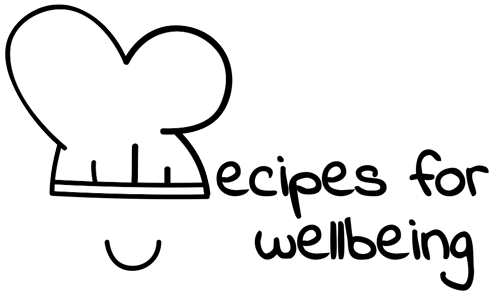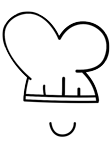Wholebeing Framework
Exploring Wholebeing
At Recipes for Wellbeing, we believe in the transformative power of Wholebeing, a concept that transcends traditional notions of wellbeing by integrating the full spectrum of human experiences — both ‘good’ and ‘bad’. Wholebeing is not merely about surviving without problems, but about embracing and growing from the challenges life presents, as well as fostering resilience, empathy, and a deeper connection to your work and the world around you. For changemakers, this journey of inner work is not optional but essential, providing the wisdom to drive meaningful, deep change.
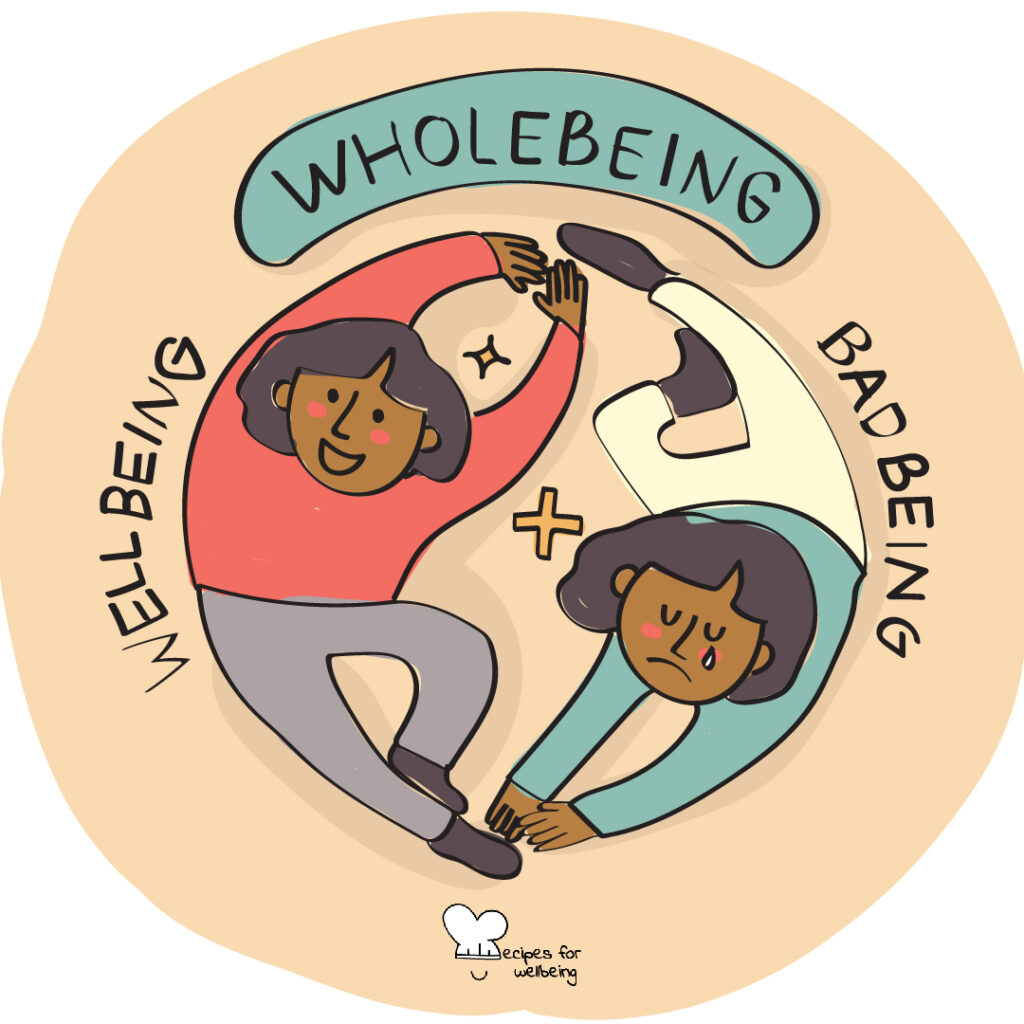
Embracing Wholebeing as a set of skills and competencies reshapes your understanding of personal and collective development, demonstrating that Wholebeing, like any skill, can be nurtured, refined, and elevated through focused intention and deliberate practice. Skills such as digital agency, grieving the future, non-extracting, and conflict transformation expand beyond the realm of mere habits. They are critical skills that significantly enhance collective wellbeing for individual, community, and planetary flourishing.
Community Wholebeing
For changemaker organisations, adopting a Wholebeing skills-based approach necessitates transforming into learning organisations that keep evolving. By deeply integrating these practices, you propel your organisation towards fulfilling its mission with agility and resilience, and at the same time shaping the wholebeing of your communities. In fact, skills like collaboration, fairness, multiperspectivity, and reciprocity are not individual endeavours inasmuch as they are embodied within the dynamics of community life.
An Ever-Evolving Concept
Acknowledging that Wholebeing is an ever-evolving concept, especially when applied systemically, invites you to appreciate the fluidity and adaptability required in its pursuit. There is no singular, linear path to achieving Wholebeing, nor can a “one-size-fits-all” approach suffice. This journey to achieve Community Wholebeing reflects the broad scope of personal wellbeing, requiring you to adopt a flexible and inclusive approach that goes beyond the limits of culture, geography, time, and conventional measures of success.
We understand Wholebeing as existing at the dynamic intersection of interconnected and interdependent ecologies: the individual, the community, and Nature. This integrated perspective emphasises that your wellbeing is not isolated, but deeply entwined with the wellbeing of your communities and the natural world. Wholebeing emerges from a deep understanding of your place within these ecologies, guiding you towards a transformative journey that redefines your individual life in the collective.
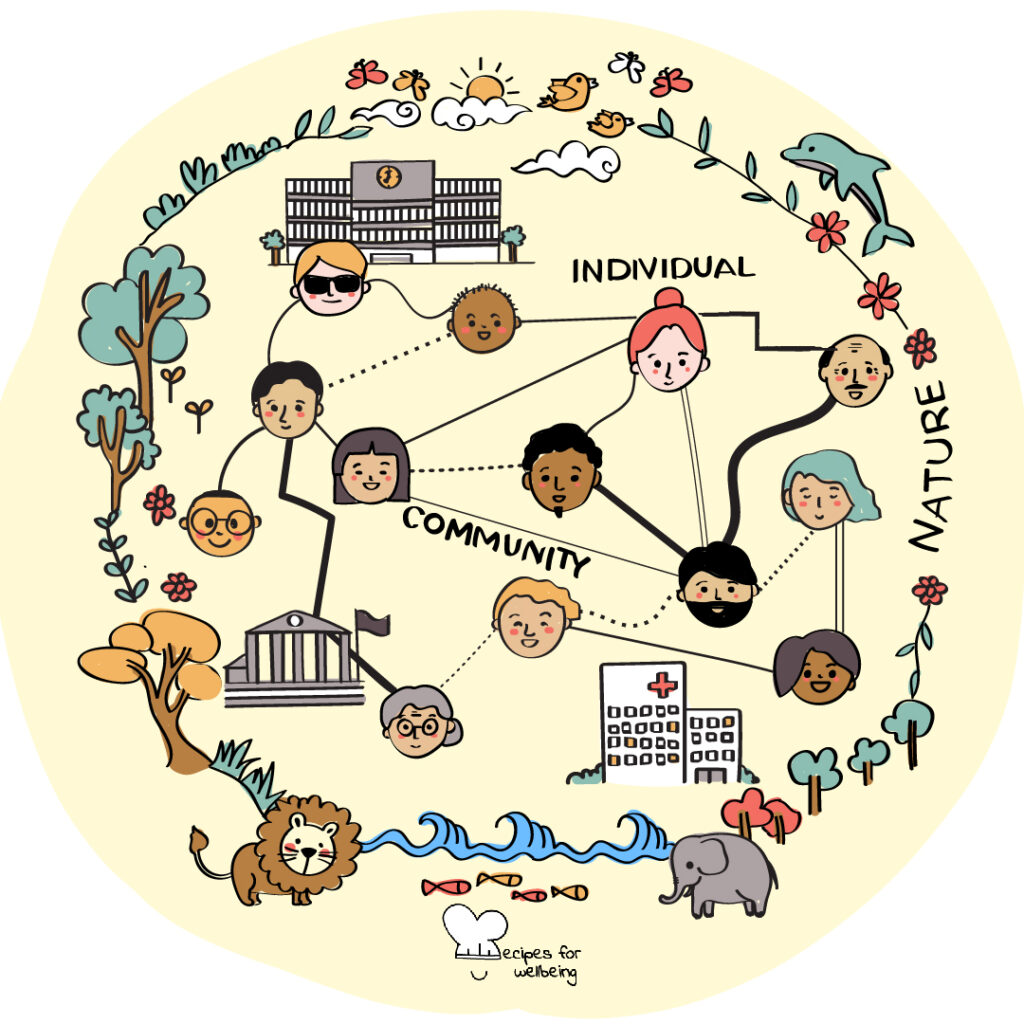
Thriving Together
At the heart of Community Wholebeing lies the concept of “Thriving Together”. This journey reimagines your collective existence, emphasising that the essence of true thriving extends beyond individual self-care to a more holistic vision of communal care. It is about shifting the responsibility for wellbeing, empathy, justice, equity, and tangible action to the community and the broader systems you operate in, rather than any one individual.
Our Wholebeing Framework consists of 12 Wholebeing Domains designed to guide you through this collective journey. Each domain represents a critical aspect of the Thriving Together ethos, offering pathways to build skills that are essential for a regenerative, equitable, and fulfilling community life. From transforming conflict to fostering belonging, these domains encapsulate the skills you need to disperse power effectively and live in harmony with one another and the natural world.
As you explore these domains, remember that our intention is to support you in learning and embodying these principles in your daily lives, interactions, and organisational systems, paving the way for a future where we truly thrive together.
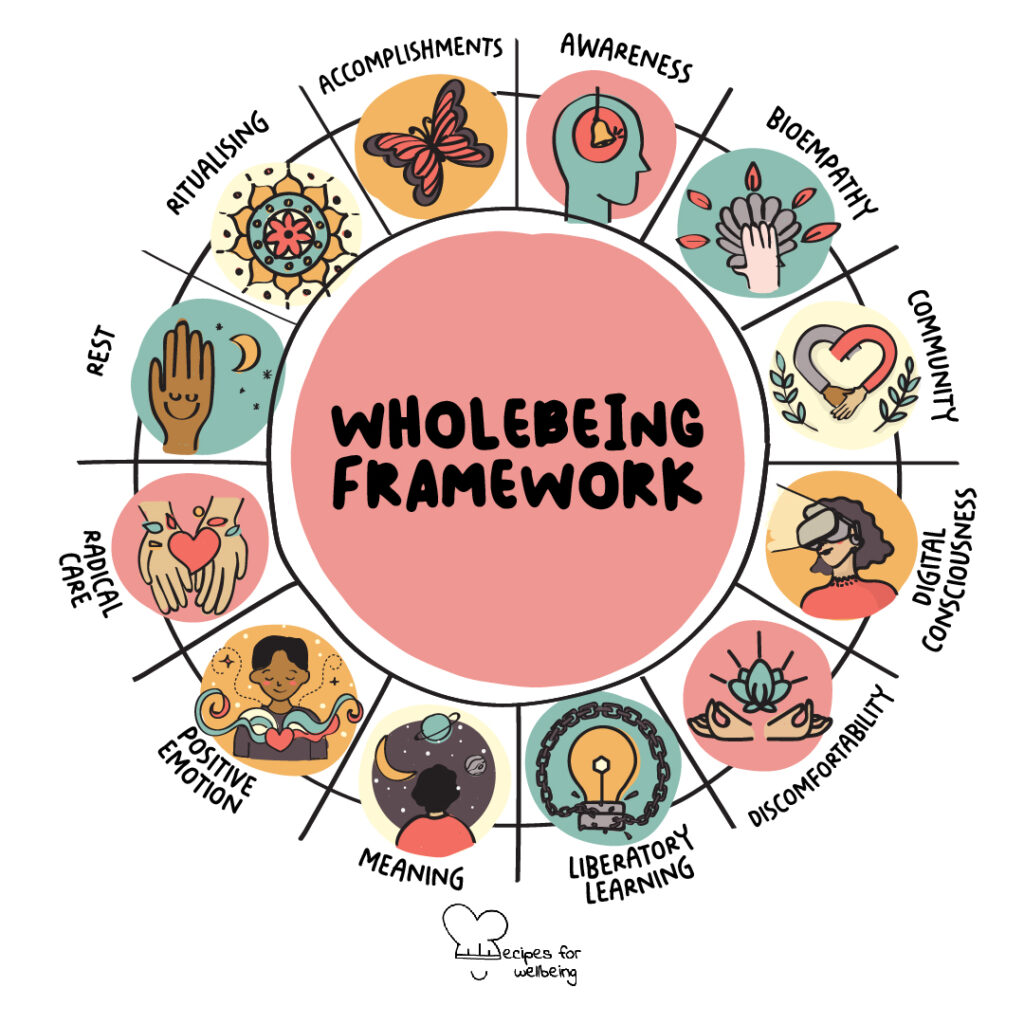
Wholebeing allows for a transformative vision for society, paving the way toward a Wellbeing Economy where our collective efforts move beyond foundational economic metrics, aligning with the needs of both people and the planet. In this envisioned economy, the relentless pursuit of GDP growth gives way to the cultivation of shared wellbeing and systemic change. It imagines a world wherein every individual experiences security, happiness, and fulfilment, all within the embrace of a thriving natural environment and a society that deeply values connection, creativity, and collective wellbeing.
Wholebeing skills are crucial in bringing this vision to life. By emphasising skills that enhance personal wellbeing, foster societal liberation, and promote environmental regeneration, we lay the groundwork for a profound paradigm shift in the landscape of impact work. This approach broadens the scope beyond the conventional focus on “green” or “future skills” to include a comprehensive array of practices that nurture life’s thriving on Earth. For community organisers, impact conveners, and social innovators, embedding Wholebeing skills into every facet of your endeavours is essential for steering our collective future towards sustainability, equity, and justice.
At Recipes for Wellbeing, we are committed to advancing this vision through our Wholebeing Framework, consisting of 150+ Wholebeing Skills mapped across 12 Wholebeing Domains designed to empower changemakers and organisations in pursuing a Wellbeing Economy.
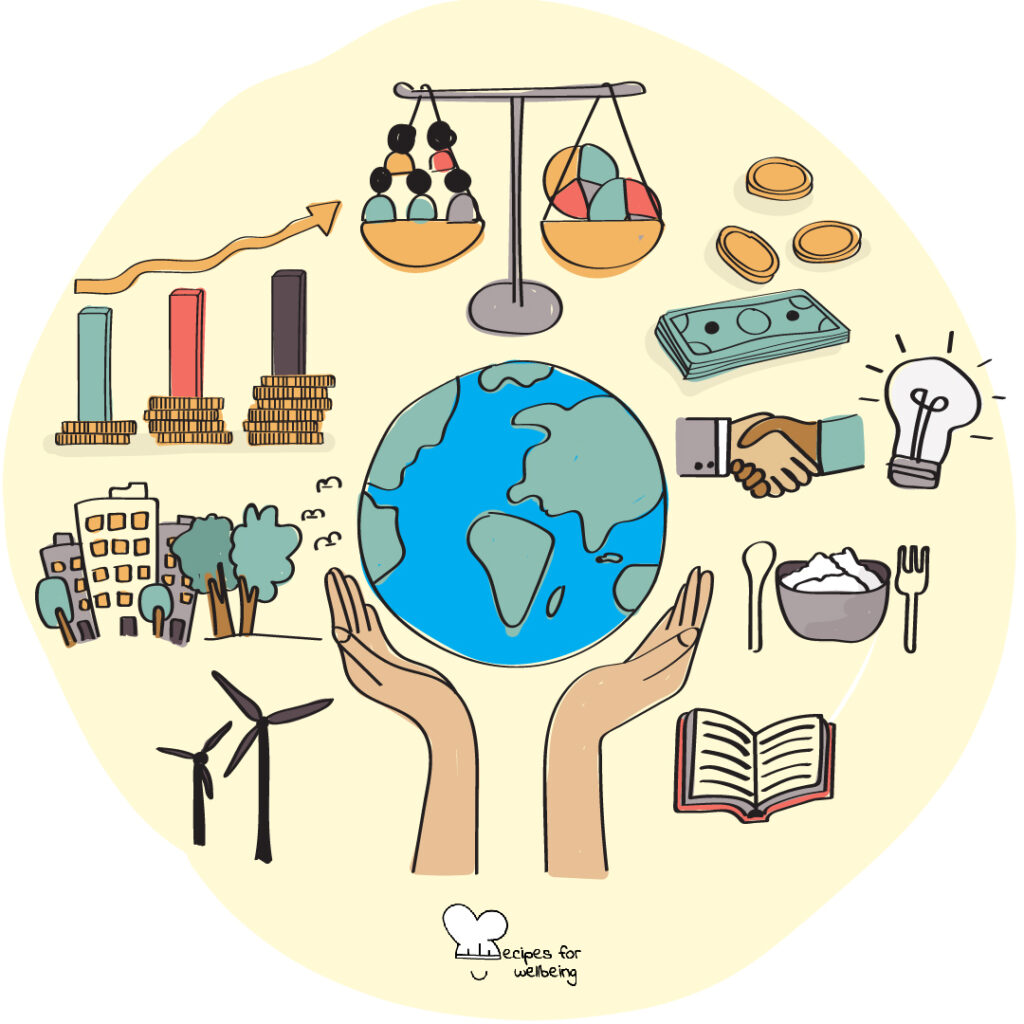
Wholebeing Domains & Skills
A Wholebeing Domain is a core area of focus encompassing related skills essential for wholebeing and changemaking. A Wholebeing Skill is a learnable capability that empowers individuals and communities to thrive while creative positive change.
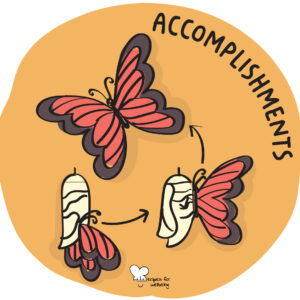
Accomplishments is the ability to channel your motivation and talents to strive for Wholebeing. It involves leaning into discomfort and persevering through resistance. This includes skills such as accountability and planning.
- Accountability*: Taking responsibility for the impact of your actions and inactions.
- Agility: Thinking and acting quickly and easily.
- Ambition: Aspiring to achieve something bold.
- Assertiveness: Communicating and behaving with confidence.
- Celebration*: Joyfully acknowledging someone or something important.
- Contentment*: Being happy and satisfied.
- Determination: Trying to do something even when it is difficult.
- Discernment: Making good judgements.
- Flexibility*: Openness to change or be changed easily to suit any new situation.
- Flourishing*: Growing well and wholly.
- Goal-setting*: Defining objectives and outcomes to be achieved.
- Humility: Keeping your ego at bay.
- Legacy: Leaving a positive trace in the world.
- Ordinariness: Being content about who you are.
- Perseverance*: Determination to keep trying to achieve something in spite of challenges.
- Planning: Strategically designing roadmaps to actualise a vision.
*This skill belongs to more than one domain.
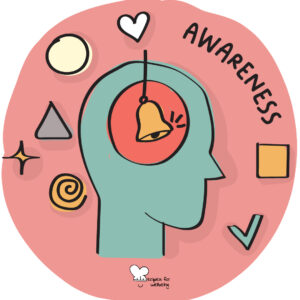
Awareness is the ability to stay present with each moment as it is, without judgement. It involves moving beyond autopilot to be present with the here and now. This includes skills such as mindfulness and reflection.
- Acceptance*: Meeting situations and emotions with openness and equanimity.
- Balance: Maintaining harmony between different elements at work and in life.
- Breathing: Using the breath to come into the present moment and connect with yourself.
- Centring: Ground your attention on something or someone to be fully present.
- Clarity: Thinking and perceiving with precision to act skillfully.
- Contemplation: Thinking quietly and profoundly.
- Focus: Placing deliberate attention to something or someone in particular.
- Letting go: Accepting what cannot be changed and stop worrying about it.
- Mind-body-connection: Listening to the wisdom of your body to bring back balance.
- Mindfulness: Observing what arises in and around you, on purpose, in the present moment, and without judgement.
- Non-attachment: Overcoming your emotional attachment or desire for worldly concerns and experiences.
- Non-judgement: Refraining from judging.
- Perspective: Sensibly judging situations to maintained a more balanced outlook.
- Presence: Bring your whole and undivided attention to the present moment.
- Reflection*: Intentionally examining your thoughts, emotions, and experiences.
- Self-awareness: Attuning to your inner landscape, patterns, and triggers.
- Solitude: Finding enjoyment when you are alone.
*This skill belongs to more than one domain.
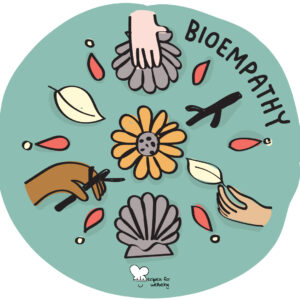
Bioempathy is the ability to return to our innate connection with Nature and learn to coexist and flourish with the natural world, recognising that we are an integral part of it. This includes skills such as consciously engaging with the more-than-human world.
- Aligning with the cycles*: Harmonising our daily rhythms with Earth’s natural rhythms, like seasons and lunar cycles.
- Bioinspiration: Drawing wellbeing inspiration from Nature and life’s processes.
- Ecosystem harmony: Fostering mutual thriving and interconnectedness with all living beings.
- Nature kinship*: Developing a loving and empathetic relationship with the natural world.
- Nature sensitivity: Attuning senses to appreciate the beauty and subtleties of the natural world.
*This skill belongs to more than one domain.
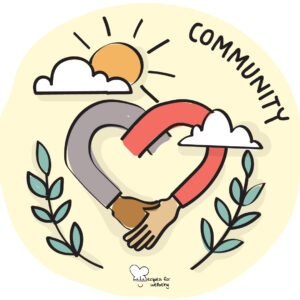
Community is the ability to extend beyond individual self-care towards fostering community care. It involves placing the onus of action on the community versus the individual. This includes skills such as multiperspectivity and equity.
- Allyship: Supporting and standing with marginalised groups through education, advocacy, and action.
- Belonging: Feeling that you are part of something larger than you where you are safe and can bring your full self.
- Championing: Publicly fighting for and defending an aim or principle or other people.
- Check-in*: Inviting people to land into the conversation.
- Check-out*: Preparing people to bring a conversation to a close.
- Closeness: Building intimacy and familiarity through shared experiences.
- Collaboration: Working together to accomplish shared goals.
- Community-building: Deepening the bonds between a group of people who care about each other and feel they belong together.
- Conflict transformation*: Engaging tension and disagreement to move towards something positive.
- Diversity: Inviting a diverse representation of people.
- Equity: Ensuring a fair treatment of all people.
- Fairness: Treating others in a way that is right or equal.
- Honesty: Telling the truth and not behaving in a deceiving way.
- Hosting conversations: Facilitating inclusive, participatory, heart-centred dialogue.
- Inclusion: Enabling all people to make meaningful contributions.
- Kindness: Behaving with gentleness and care.
- Liberation*: Freeing yourself and others from feelings, conditions, and systems that oppress you.
- Multiperspectivity: Extending your understanding to hold the complexity of multiple viewpoints.
- Nature kinship*: Developing a loving and empathetic relationship with the natural world.
- Non-extracting: Avoiding the difficult removal of precious and limited resources.
- Reciprocity: Fostering relationships characterised by mutual care and support.
- Relating to Others: Forming meaningful bonds with others through practices such as deep listening, presence, and vulnera-bravery.
*This skill belongs to more than one domain.
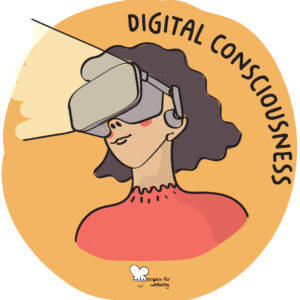
Digital Consciousness is the ability to engage with digital spaces and algorithms consciously and meaningfully. It involves nurturing Wholebeing and communities in virtual environments. This includes skills such as digital agency and digital boundaries.
- Digital agency: Taking ownership of your digital choices.
- Digital boundaries: Setting healthy limits on when and how you engage with digital technologies.
- Digital detoxing: Abstaining from digital devices and virtual spaces for a period of time to rest and reconnect.
- Digital discernment: Making good judgements about all-things-digital.
- Digital disconnection: Powering down and disengaging from digital technologies to be fully present.
- Digital relating: Fostering human-centred digital relationships.
*This skill belongs to more than one domain.
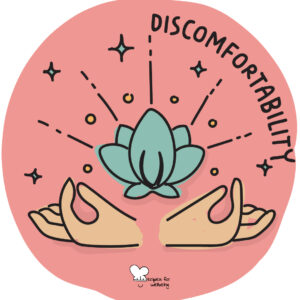
Discomfortability is the ability to be at ease with discomfort and working through resistance instead of fighting it. It involves acknowledging the full range of human experience, both the ‘good’ and the ‘bad.’ This includes skills such as agency and self-regulation.
- Acceptance*: Meeting situations and emotions with openness and equanimity.
- Adaptability: Changing to thrive in new, different, or difficult situations.
- Agency: Taking ownership of your choices and actions.
- Boundary setting*: Defining and communicating appropriate limits.
- Compassion*: Feeling concern for your own or someone else’s pain or suffering and wishing to bring relief.
- Dealing with shame: Managing the fear of ridicule and belitting.
- Decision-making: Making good decisions.
- Grieving: Moving through the sadness connected to loss.
- Grieving the future: Moving through the sadness of what will not be.
- Flexibility*: Openness to change or be changed easily to suit any new situation.
- Forgiveness: Releasing anger and blame towards those who have hurt you or wronged you.
- Perseverance*: Determination to keep trying to achieve something in spite of challenges.
- Relief*: Reducing and releasing your pain or unpleasant feelings.
- Resilience: Bouncing back from adversities and setbacks.
- Self-regulation: Managing your thoughts and emotions.
- Stress management: Managing continuous feelings of worry that prevent you from relaxing.
- Vulnera-bravery: Daring to show up and let yourself be seen.
*This skill belongs to more than one domain.
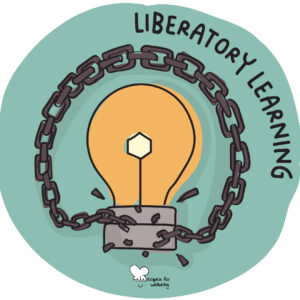
Liberatory Learning is the ability to deepen understanding to free yourself and others from oppressive systems. It involves constant unlearning and relearning. This includes skills such as liberation and self-directed learning.
- Accountability*: Taking responsibility for the impact of your actions and inactions.
- Autonomy: Being able to make your own decisions connected to your learning and flourishing.
- Body positivity: Celebrating the diversity of human bodies with respect.
- Challenging: Refusing to accept that something is right or fair.
- Check-in*: Inviting people to land into the conversation.
- Check-out*: Preparing people to bring a conversation to a close.
- Co-creation: Collectively inventing or designing something.
- Coaching: Guiding learning through powerful questions and supportive feedback.
- Conflict transformation*: Engaging tension and disagreement to move towards something positive.
- Creativity: Using imagination to generate new ideas or things.
- Curiosity: Fostering an inquisitive orientation towards learning.
- Feedback: Sharing intentional input to help someone flourish.
- Flourishing*: Growing well and wholly.
- Framing: Consciously shaping narratives and perspectives.
- Fun: Experiencing something enjoyable and exciting.
- Holding space*: Compassionately witnessing, accepting, and supporting people without judgement.
- Inquiry: Asking questions to deepen your understanding.
- Intentionality: Being deliberate about how you show up.
- Liberation*: Freeing yourself and others from feelings, conditions, and systems that oppress you.
- Play: Experiencing something enjoyable and fun.
- Reflection*: Intentionally examining your thoughts, emotions, and experiences.
- Sense-making*: Deepening understanding of something difficult or complicated.
- Self-directed learning: Taking initiative of your learning journey.
*This skill belongs to more than one domain.
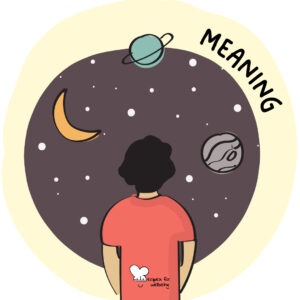
Meaning is the ability to connect and contribute to something bigger than yourself. It involves knowing that your life matters and is worth living and taking responsibility for your efforts. This includes skills such as fulfilment and having a purpose in life.
- Commitment*: Devoting yourself to what matters most and working hard to uphold your promise.
- Direction: Clarifying your purpose to guide your choices.
- Flow: Becoming fully absorbed in meaningful activities that draw on your strengths.
- Fulfilment: Being happy and satisfied with your life because you find meaning in what you do.
- Goal-setting*: Defining objectives and outcomes to be achieved.
- Purpose: Aligning to an overarching aspiration that provides a source of meaning and significance in your life.
- Sense-making*: Deepening understanding of something difficult or complicated.
- Service: Contributing your gifts to the benefit of others.
- Significance: Experiencing a sense of life’s inherent value and worthiness.
- Transcendence*: Moving beyond ordinary experiences.
*This skill belongs to more than one domain.
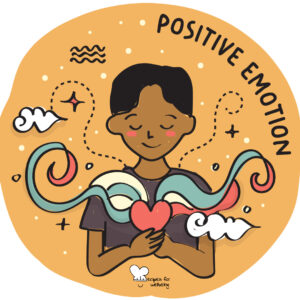
Positive Emotion is the ability to see possibilities and take in the goodness. It involves becoming a possibilist for Wholebeing. This includes skills such as gratitude and abundance.
- Abundance: Experiencing life in its abounding fullness and richness.
- Affirmation: Intentionally acknowledging and stating your inherent worthiness.
- Awe: Feeling a reverential respect mixed with fear or wonder.
- Calm: Becoming or staying tranquil and relaxed.
- Celebration*: Joyfully acknowledging someone or something important.
- Contentment*: Being happy and satisfied.
- Gratitude: Appreciating life’s gifts with an open and thankful heart.
- Happiness: Savouring positive experiences but also cultivating a deep sense of flourishing that arises from living a meaningful life.
- Hope: Persevering in meaningful endeavours regardless of how they turn out.
- Joy: Making space for a light that fills you with hope and love.
- Optimism: Adopting a constructive perspective that good things will happen.
- Peacefulness: Resting in a sense of harmony and contentment.
- Pleasure: Gaining happiness, enjoyment, or satisfaction from an experience.
- Reframing: Consciously shifting your outlook to recognise the positive.
- Relief*: Reducing and releasing your pain or unpleasant feelings.
- Serenity: Experiencing a state of extreme calmness and peacefulness.
- Zest: Fostering an eager interest and enjoyment in life.
*This skill belongs to more than one domain.
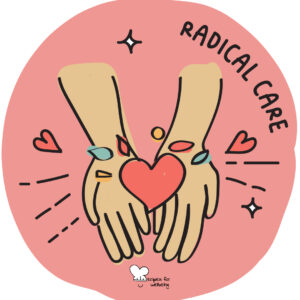
Radical Care is the ability to care radically. It involves building relationships and communities through mutual understanding and shared healing. This includes skills related to tending to ourselves and others with deep compassion.
- Acknowledgement: Recognising others through listening, validation, and bearing witness.
- Altruism: Selflessly extending care and compassion to others.
- Authenticity: Courage to show up as you are and let yourself be seen.
- Boundary setting*: Defining and communicating appropriate limits.
- Caring: Attending to others’ needs with patience, kindness, and concern.
- Compassion*: Feeling concern for your own or someone else’s pain or suffering and wishing to bring relief.
- Emotional intelligence: Understanding and skillfully working with emotions in yourself and others.
- Empathy: Sensitively perceiving and relating to another person’s experience.
- Giving: Generously providing time, energy, and resources to those in need.
- Holding space*: Compassionately witnessing, accepting, and supporting people without judgement.
- Listening: Deeply hearing others without judgement and without interference from your internal chatter.
- Love: Strong feeling of care about others.
- Openness: Being honest and willing to share about your thoughts and emotions.
- Respect: Honouring all people’s inherent dignity and worth.
- Trust: Believing in the honesty and goodness of others.
*This skill belongs to more than one domain.
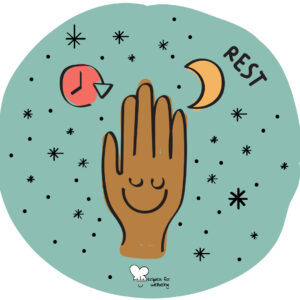
Rest is the ability to value rest and renewal as means to liberation. It involves reframing yourself as a human being, not just a human doing. This includes skills such as relaxation and slowing down.
- Liberation*: Freeing yourself and others from feelings, conditions, and systems that oppress you.
- Non-performing: Freeing yourself from the pressure of being always-on and productive.
- Pausing: Building in small breaks to recharge and reset.
- Relaxation: Consciously releasing tension from the mind and body to reach a state of calm and comfort.
- Seeking support: Asking for and accepting help when needed.
- Sleep: Prioritising sufficient restorative rest for your mind and body.
- Slowing down: Deliberately reducing the pace of your life and busyness.
- Stillness: Making space for quietness admist activity.
- Time management: Strategically organising your schedule to optimise performance and preserve energy.
*This skill belongs to more than one domain.
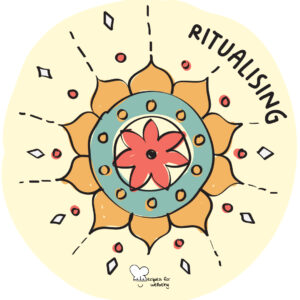
Ritualising is the ability to cultivate Wholebeing through daily and seasonal rituals. It involves reclaiming the sacredness in your life. This includes skills such as journaling and embodiment.
- Aligning with the cycles*: Harmonising our daily rhythms with Earth’s natural rhythms, like seasons and lunar cycles.
- Commitment*: Devoting yourself to what matters most and working hard to uphold your promise.
- Embodiment: Tuning into your senses, movements, and relationship to space.
- Exercising: Integrating physical activity to stay healthy.
- Hosting yourself
- Intention-setting: Clarifying desired outcomes before engaging in meaningful activities.
- Journaling: Processing thoughts, feelings, and experiences through writing.
- Movement: Expressing yourself physically through dance, yoga, walking, etc.
- Nature kinship*: Developing a loving and empathetic relationship with the natural world.
- Refuge: Seeking shelter or protection in yourself.
- Ritualising: Infusing meaning and sacredness in your life through everyday routines.
- Storytelling: Sharing narratives to impart wisdom and nurture community.
- Transcendence: Moving beyond ordinary experiences.
*This skill belongs to more than one domain.
